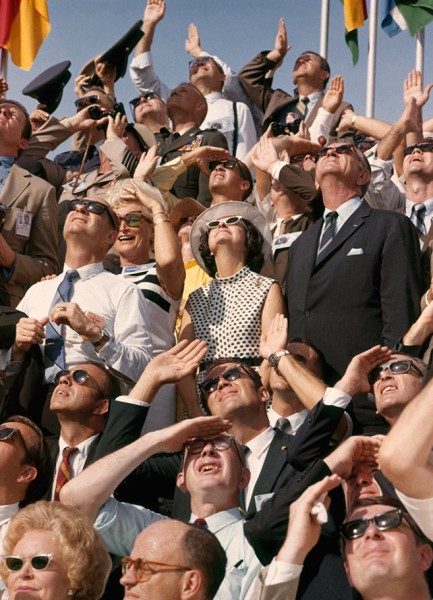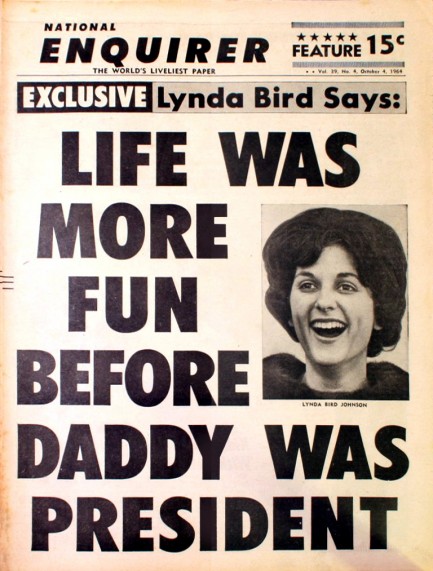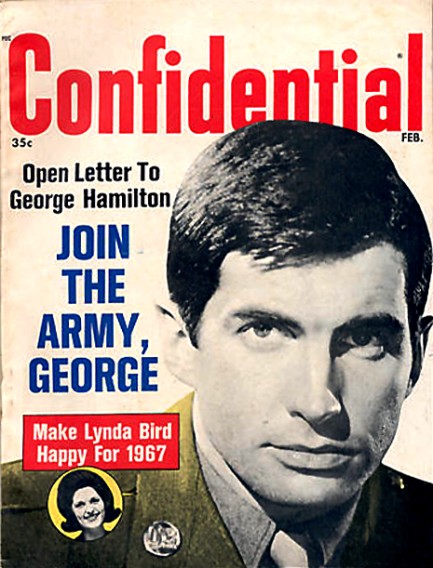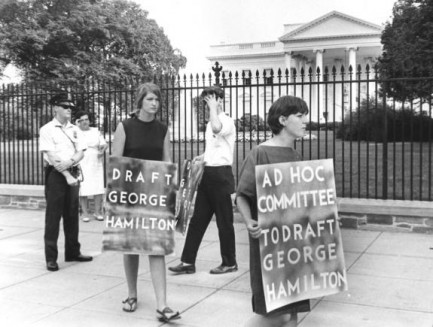 What a hypnotic sight. Maybe one day we'll have a Space Force and threaten to rain fire down upon the planet. 
In this photo made today in 1969, U.S. President Lyndon B. Johnson, Lady Bird Johnson, Vice President Hubert Humphrey, and a crowd of others watch Apollo 11 lift off from Cape Canaveral, Florida. Back then it must have seemed almost miraculous. A bunch of theoretical scientists in the U.S. and Soviet Union said manned spaceflight would work, the politicians went, “Great—here's some billions of dollars or rubles to make it happen.” And years later it did when Yuri Gagarin became the first human in space. But Apollo 11 was the big one, in our opinion. It's one thing to toss a person into space in a hollow cannonball like Sputnik, and another bowl of pancake batter altogether to send people to another world and bring them back alive. Opinions vary, of course, but we think this flight was and remains the most important rung on humanity's celestial ladder. As things are developing, with countries reneging on their promises not to exploit space for monetary or military gain, it would be better for both the cosmos and Earth if there are no more rungs for a while. Neil Armstrong's quote, when he set foot on the moon, was, “One small step for man, one giant leap for mankind.” We've taken a giant leap backwards since then.
 Being first daughter isn’t all roses. For one thing, you have to endure second rate journalists making passes at you. 
Seems about the right time to post this front from the National Enquirer that concerns itself with life in the White House. Or more specifically, with the life of first daughter Lynda Bird Johnson, who reveals she had more fun before her dad was president. Shocking? Perhaps back then it was. She says, “I wish everybody wouldn’t take such an interest in me. I sometimes wonder if all the photographers in the world have shares in Eastman Kodak. All they seem to do is shoot off film after film.” Enquirer scribe Jim Gordon doesn’t get to delve into this admission because he’s too busy trying to delve into Lynda Bird’s lady parts. The interview took place at a barbecue in Water Mill, New York, and at one point Gordon, who we’re told is 22, asks the 20-year-old Johnson out, declaring, “I’d love to date you. What’s your phone number?” She laughs it off, but Gordon isn’t finished. He starts to ask her to dance but changes his mind when he sees the Secret Service lurking.
In the end, the story feels like it’s more about Gordon than Johnson, but maybe it had to be, considering her meager quotes add up to about ninety seconds of real-world time. Probably Gordon was an aspiring freelancer who finagled his way into the function, briefly cornered Johnson, then whipped his encounter into a journalistic froth the Enquirer was only too happy to buy. It makes sense, because we can’t imagine anyone in the First Family consenting to be interviewed by a scandal rag, especially with an election mere weeks away—which we can discern from the publication date, today in 1964. But Gordon’s self promotion didn’t work, as far as we know. We can find no reference to him online, with the National Enquirer or anywhere else. As for Lynda Bird Johnson, thanks to Gordon’s non-interview readers learned little more about her than they already knew.
 All of America seemed to want George Hamilton sent to Southeast Asia. 
We’re doubling up on Confidential this weekend because we have so many. Here’s another February issue, this one from 1967, with an unusual white cover featuring actor George Hamilton. What was the big deal about him joining the army? Well, he was dating Lynda Bird Johnson, who happened to be the daughter of Lady Bird Johnson, who happened to be the wife of president Lyndon Baines Johnson. Pro-Vietnam War Confidential is urging him to prove to America that he was not passed over in the draft because of his connection to the White House. The idea of pressing for men such as Hamilton to be inducted also made sense to the anti-war left, which believed putting the scions of high society in jeopardy would hasten the end of the country’s Asian misadventure. You see that strategy being carried out below, by three members of the Ad Hoc Committee to Draft George Hamilton. We have no data on whether pushing for more upper class draftees hastened the end of the war, and we doubt any exists. But it’s true that minority participation and casualties fell as the conflict progressed—though the numbers didn’t shift as radically as many people think. end of the war, and we doubt any exists. But it’s true that minority participation and casualties fell as the conflict progressed—though the numbers didn’t shift as radically as many people think. As far as whether Hamilton’s relationship with Lynda Bird Johnson actually kept him out of Southeast Asia, officially at least, he was eventually passed permanently over because he represented the sole means of support for his mother. It's a reasonable sounding excuse—far more believable than the bunions, bone spurs, and other conditions suddenly suffered by the rich—but Confidential shreds Hamilton's deferral succintly: "As sole support of your mother you escaped the draft. Now you have $1,000,000, a Rolls Royce, and a 39-room house. So what's holding you back, tiger?"
|
 |

The headlines that mattered yesteryear.
2003—Hope Dies
Film legend Bob Hope dies of pneumonia two months after celebrating his 100th birthday. 1945—Churchill Given the Sack
In spite of admiring Winston Churchill as a great wartime leader, Britons elect
Clement Attlee the nation's new prime minister in a sweeping victory for the Labour Party over the Conservatives. 1952—Evita Peron Dies
Eva Duarte de Peron, aka Evita, wife of the president of the Argentine Republic, dies from cancer at age 33. Evita had brought the working classes into a position of political power never witnessed before, but was hated by the nation's powerful military class. She is lain to rest in Milan, Italy in a secret grave under a nun's name, but is eventually returned to Argentina for reburial beside her husband in 1974. 1943—Mussolini Calls It Quits
Italian dictator Benito Mussolini steps down as head of the armed forces and the government. It soon becomes clear that Il Duce did not relinquish power voluntarily, but was forced to resign after former Fascist colleagues turned against him. He is later installed by Germany as leader of the Italian Social Republic in the north of the country, but is killed by partisans in 1945.
|

|
|

It's easy. We have an uploader that makes it a snap. Use it to submit your art, text, header, and subhead. Your post can be funny, serious, or anything in between, as long as it's vintage pulp. You'll get a byline and experience the fleeting pride of free authorship. We'll edit your post for typos, but the rest is up to you. Click here to give us your best shot.

|
|






 end of the war, and we doubt any exists. But it’s true that minority participation and casualties fell as the conflict progressed—though the numbers didn’t shift as radically as many people think.
end of the war, and we doubt any exists. But it’s true that minority participation and casualties fell as the conflict progressed—though the numbers didn’t shift as radically as many people think.



































































